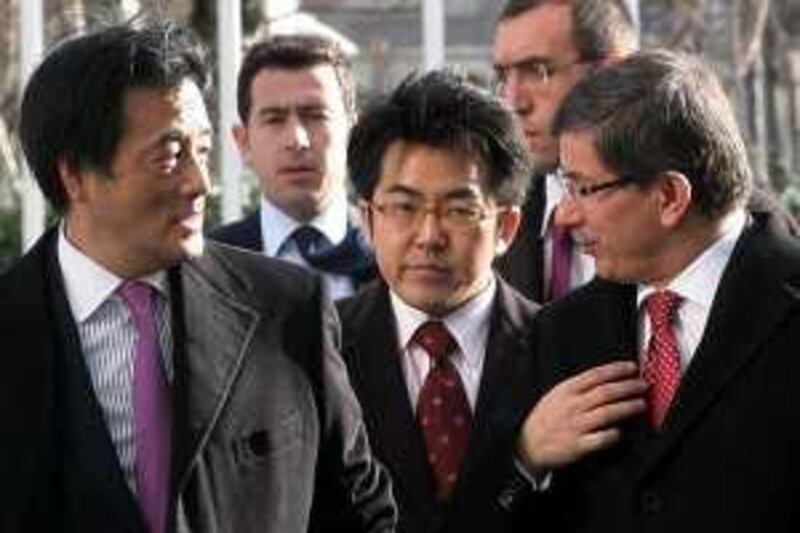ISTANBUL // For about 200 Turkish diplomats, the new year starts with an unprecedented experience. This week, foreign statesmen like Mahmoud Abbas, the Palestinian president, will address a meeting of ambassadors and other officials in Ankara designed to widen the horizon of the country's diplomatic corps and prepare it for a foreign policy of "360 degrees". The five-day meeting under the motto, "Democracy, security and stability: A look at the world and Turkish foreign policy in 2010" kicked off yesterday and will see lectures by Mr Abbas as well as by Mehmet Ali Talat, the Turkish Cypriot leader, and speeches by the foreign ministers of Brazil, Germany and Japan.
It is the second meeting of Turkish ambassadors since Ahmet Davutoglu, the Turkish foreign minister, took office last spring, and the first time ever that foreign politicians will address a conference of Turkish diplomats. The meeting would serve Turkey's national interests and contribute to a "multidimensional foreign policy", the foreign ministry said in a statement. "Turkey's geographical situation is at a central point" of international politics, Mr Davutoglu told the meeting yesterday, according to news reports. "One can see that geographical region as a risk or as an advantage and a potential. We see it as a potential and an advantage."
Situated between Europe, the Caucasus and the Middle East, Turkey had to be ready to react to any crisis in its part of the world, the minister said. "Our radar has to be switched on constantly," he said. "Every crisis in our neighbourhood represents a chance to implement our vision at the same time." The conference in Ankara offers a glimpse of what Mr Davutoglu, a former professor of international relations, has in mind for his country in the coming years. He sees Turkey, the only Muslim member state of Nato, an EU candidate and a member of the G20 group of the world's biggest economies, as a potential leader in the region and has taken several steps to increase the country's weight on the word stage. "There has to be a Turkish vision for every place and every issue," he told his diplomats yesterday.
"It is a real change, even a drastic change from Turkey's foreign policy in the past, which was regarded as passive," Mensur Akgun, a professor of international relations at Istanbul Culture University, said yesterday. "For the first time in our history, we are trying to find solutions for the problems in the region." Since taking office last May, Mr Davutoglu has presided over improvements in Turkey's relations with Syria, Iraq and Iran, and he has signed a set of ground-breaking agreements with Armenia. "Turkey's horizon is 360 degrees," Mr Davutoglu told reporters last week.
Addressing the conference in Ankara yesterday, the minister said that it was not enough for Turkish diplomats to learn English and French, the traditional languages of international diplomacy. "We will offer new possibilities to learn the languages of our region." A look at the destinations of foreign trips by Mr Davutoglu and his predecessor Ali Babacan last year shows that Turkey is looking to the West as well as to the East. According to Mr Davutoglu, he and Mr Babacan visited a total of 93 countries in 2009. EU member states and other European countries accounted for about half of the trips, while there were 22 visits to Middle Eastern countries and 15 to Asia. Only a day before his diplomats gathered in Ankara, Mr Davutoglu returned from a visit to Saudi Arabia.
Referring to concerns that Turkey may be about to change its foreign policy axis by turning away from the West with its improved ties to eastern neighbours, Mr Davutoglu said last week his country would continue with its bid to join the European Union. "Our axis is Ankara," he said. In recent years, Turkey has stepped up its efforts to get involved in the resolution of several conflicts in the region. Ankara sent soldiers to participate in an international peacekeeping force in Lebanon and orchestrated indirect talks between Syria and Israel; the talks broke down a year ago. The Turkish government also tried to mediate between Russia and Georgia after the short war of 2008.
Prof Akgun said the Caucasus initiative of 2008 provided a good example of what Turkey's soft power could do. "There were no concrete results, and no one expected them," he said about Ankara's offer to establish a "Caucasus Stability and Co-operation Pact" after the war in South Ossetia. "But it helped to cool down and contain the conflict." As Turkey has become used to a more active role in world politics, the government of Recep Tayyip Erdogan, the prime minister, has also changed its rhetoric, Prof Akgun said. Last year, Mr Erdogan raised eyebrows with his harsh criticism of Israel's military operation in the Gaza Strip. The prime minister also defended Iran's right to pursue a non-military nuclear programme and said some of the West's criticism against Tehran was unfair.
"Turkey feels much more self-confident," Prof Akgun said about the outspokenness of members of the Erdogan government. "They are able to say whatever they want to say." Mr Davutoglu's speech yesterday reflected Ankara's increased self-confidence. "We have a lot of things to say in the international arena," the foreign minister said. "And there are big nations that will listen to us." @Email:tseibert@thenational.ae






